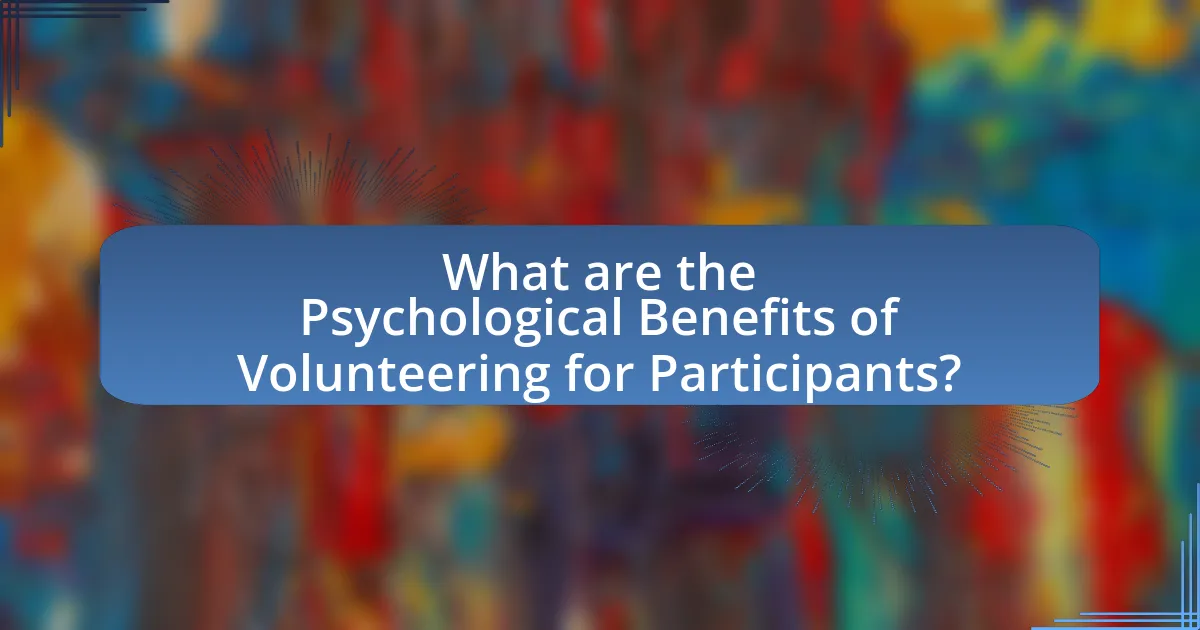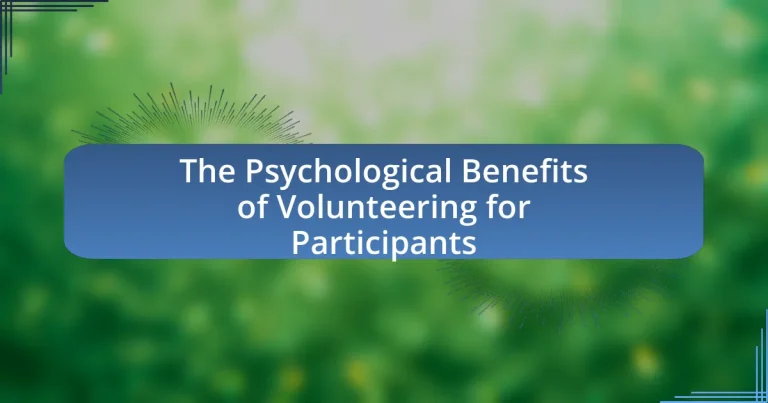The article focuses on the psychological benefits of volunteering for participants, highlighting how engaging in volunteer work enhances mental well-being, increases life satisfaction, and reduces symptoms of depression and anxiety. Research indicates that volunteers experience improved emotional health, greater social connections, and a stronger sense of purpose, leading to higher levels of happiness and lower feelings of loneliness. Additionally, the article addresses motivations for volunteering, barriers to participation, and practical tips for enhancing the volunteering experience, emphasizing the significant positive impact of altruistic behavior on individual mental health and community well-being.

What are the Psychological Benefits of Volunteering for Participants?
Volunteering provides significant psychological benefits for participants, including enhanced mental well-being, increased life satisfaction, and reduced symptoms of depression. Engaging in volunteer work fosters a sense of purpose and belonging, which can lead to improved self-esteem and overall happiness. Research published in the Journal of Happiness Studies indicates that individuals who volunteer regularly report higher levels of life satisfaction and lower levels of depression compared to non-volunteers. Additionally, a study by the Corporation for National and Community Service found that volunteering can lead to a 27% increase in the likelihood of being happy, demonstrating a clear link between volunteerism and positive psychological outcomes.
How does volunteering impact mental health?
Volunteering positively impacts mental health by enhancing emotional well-being and reducing symptoms of depression and anxiety. Engaging in volunteer work fosters a sense of purpose and belonging, which can lead to increased life satisfaction. Research published in the Journal of Happiness Studies indicates that individuals who volunteer regularly report higher levels of happiness and lower levels of stress. Additionally, a study by the Corporation for National and Community Service found that volunteers experience improved mental health outcomes, including a 27% increase in the likelihood of reporting good mental health compared to non-volunteers.
What specific mental health improvements can be observed in volunteers?
Volunteers often experience specific mental health improvements such as reduced symptoms of depression and anxiety, increased life satisfaction, and enhanced overall well-being. Research indicates that engaging in volunteer work can lead to a 27% reduction in depression symptoms and a 20% decrease in anxiety levels among participants. Additionally, a study published in the Journal of Happiness Studies found that individuals who volunteer report higher levels of happiness and life satisfaction compared to non-volunteers, highlighting the positive psychological impact of altruistic behavior.
How does volunteering reduce feelings of loneliness and isolation?
Volunteering reduces feelings of loneliness and isolation by fostering social connections and providing a sense of purpose. Engaging in volunteer activities allows individuals to meet new people, build relationships, and create a supportive community. Research indicates that social interactions through volunteering can significantly enhance emotional well-being; for instance, a study published in the Journal of Happiness Studies found that individuals who volunteer regularly report higher levels of life satisfaction and lower levels of loneliness. This connection to others and the fulfillment derived from helping those in need contribute to a stronger sense of belonging, effectively mitigating feelings of isolation.
Why do people choose to volunteer?
People choose to volunteer primarily to gain psychological benefits such as increased happiness and a sense of purpose. Research indicates that volunteering can lead to improved mental health, as individuals often experience reduced feelings of depression and anxiety when engaging in altruistic activities. A study published in the Journal of Happiness Studies found that volunteers reported higher levels of life satisfaction and well-being compared to non-volunteers, highlighting the positive impact of helping others on one’s own mental state.
What motivations drive individuals to engage in volunteer work?
Individuals engage in volunteer work primarily due to intrinsic motivations such as the desire to help others, personal fulfillment, and the pursuit of social connections. Research indicates that many volunteers report feelings of satisfaction and happiness derived from contributing to their communities, which aligns with findings from the Corporation for National and Community Service, showing that volunteering can enhance emotional well-being. Additionally, social motivations, including the opportunity to meet new people and build relationships, play a significant role, as highlighted in studies by the National Institute for Health Research, which found that social engagement through volunteering can lead to improved mental health outcomes.
How does personal fulfillment play a role in the decision to volunteer?
Personal fulfillment significantly influences the decision to volunteer, as individuals often seek meaningful experiences that enhance their sense of purpose. Research indicates that people who volunteer report higher levels of life satisfaction and emotional well-being, which reinforces their motivation to engage in altruistic activities. For instance, a study published in the Journal of Happiness Studies found that volunteering is associated with increased happiness and a stronger sense of community belonging, demonstrating that personal fulfillment is a key driver in the choice to volunteer.
What are the long-term psychological effects of volunteering?
The long-term psychological effects of volunteering include enhanced well-being, increased life satisfaction, and reduced symptoms of depression. Research indicates that individuals who engage in volunteer work experience a greater sense of purpose and belonging, which contributes to improved mental health outcomes. A study published in the Journal of Happiness Studies found that volunteers reported higher levels of happiness and lower levels of stress compared to non-volunteers. Additionally, consistent volunteering has been linked to lower rates of anxiety and depression, as it fosters social connections and a sense of community.
How does volunteering contribute to a sense of purpose and meaning in life?
Volunteering contributes to a sense of purpose and meaning in life by fostering connections with others and enhancing personal fulfillment. Engaging in volunteer work allows individuals to contribute to their communities, which can lead to increased feelings of belonging and social support. Research indicates that people who volunteer report higher levels of life satisfaction and well-being, as evidenced by a study published in the Journal of Happiness Studies, which found that volunteering is associated with a 20% increase in happiness levels among participants. This sense of purpose derived from helping others not only boosts self-esteem but also reinforces one’s values and beliefs, creating a deeper understanding of one’s role in society.
What role does volunteering play in developing resilience and coping skills?
Volunteering plays a significant role in developing resilience and coping skills by providing individuals with opportunities to face challenges and adapt to new situations. Engaging in volunteer work often exposes participants to diverse environments and social issues, which can enhance their problem-solving abilities and emotional regulation. Research indicates that individuals who volunteer report higher levels of resilience, as they learn to navigate difficulties while contributing to their communities. For instance, a study published in the Journal of Community Psychology found that volunteers demonstrated improved coping strategies and greater psychological well-being, highlighting the direct correlation between volunteering and enhanced resilience.
How can volunteering enhance social connections?
Volunteering enhances social connections by providing opportunities for individuals to meet and interact with others who share similar interests and values. Engaging in volunteer work fosters a sense of community and belonging, as participants collaborate towards common goals, which can lead to the formation of friendships and support networks. Research indicates that individuals who volunteer report higher levels of social interaction and lower levels of loneliness, as evidenced by a study published in the Journal of Social Issues, which found that volunteering significantly increases social engagement and strengthens interpersonal relationships.
What types of social interactions are fostered through volunteering?
Volunteering fosters various types of social interactions, including collaborative teamwork, community engagement, and interpersonal relationships. These interactions occur as volunteers work together towards common goals, enhancing their sense of belonging and social connectedness. Research indicates that individuals who volunteer report increased social networks and improved social skills, as they engage with diverse groups and build relationships based on shared interests and values. For instance, a study published in the Journal of Community Psychology found that volunteering significantly enhances social capital, which is crucial for fostering trust and cooperation within communities.
How does volunteering help build community and social networks?
Volunteering helps build community and social networks by fostering connections among individuals who share common interests and goals. When people engage in volunteer activities, they collaborate with others, which enhances social interaction and creates a sense of belonging. Research indicates that individuals who volunteer are more likely to develop friendships and social ties, as they meet diverse groups of people and work together towards a common purpose. For instance, a study published in the Journal of Community Psychology found that volunteering significantly increases social capital, which refers to the networks of relationships among people in a community. This increased social capital leads to stronger community bonds and a more supportive environment.
What are the barriers to volunteering and how can they be overcome?
Barriers to volunteering include time constraints, lack of awareness about opportunities, and perceived lack of skills. Time constraints often arise from busy schedules, making it difficult for individuals to commit to volunteering. To overcome this, organizations can offer flexible volunteering options, such as short-term projects or virtual opportunities, which accommodate varying schedules. Lack of awareness can be addressed through targeted outreach and marketing efforts that inform potential volunteers about available opportunities and their benefits. Additionally, perceived lack of skills can be mitigated by providing training and support, ensuring that individuals feel equipped to contribute effectively. Research indicates that addressing these barriers can significantly increase volunteer participation, enhancing both community support and individual psychological benefits.
What common misconceptions prevent people from volunteering?
Common misconceptions that prevent people from volunteering include the belief that volunteering requires a significant time commitment, that it is only for those with specialized skills, and that it does not provide any personal benefits. Many individuals think they must dedicate extensive hours, but even small contributions can make a difference. Additionally, the notion that only experts can volunteer overlooks the fact that many organizations welcome help from people with diverse backgrounds and abilities. Lastly, the misconception that volunteering is purely altruistic ignores the psychological benefits, such as improved mental health and increased happiness, that volunteers often experience. Research indicates that volunteering can lead to lower rates of depression and higher life satisfaction, reinforcing the idea that participation is beneficial for both the community and the individual.
How can organizations encourage more individuals to participate in volunteer activities?
Organizations can encourage more individuals to participate in volunteer activities by creating engaging and meaningful opportunities that align with the interests and values of potential volunteers. Research indicates that when organizations clearly communicate the impact of volunteer work, such as improving community well-being or addressing specific social issues, individuals are more likely to feel motivated to contribute. For instance, a study published in the Journal of Community Psychology found that individuals are more inclined to volunteer when they perceive a direct connection between their efforts and positive outcomes in their community. Additionally, providing flexible scheduling, recognizing volunteers’ contributions, and fostering a sense of community among volunteers can further enhance participation rates.
What practical tips can enhance the volunteering experience for participants?
To enhance the volunteering experience for participants, organizations should provide clear expectations and training. Clear expectations help volunteers understand their roles, leading to increased satisfaction and effectiveness. Training equips volunteers with necessary skills, fostering confidence and engagement. Research indicates that well-prepared volunteers are more likely to report positive experiences and psychological benefits, such as increased well-being and social connectedness. Additionally, creating opportunities for feedback allows participants to express their thoughts, further improving their experience and the overall program.

